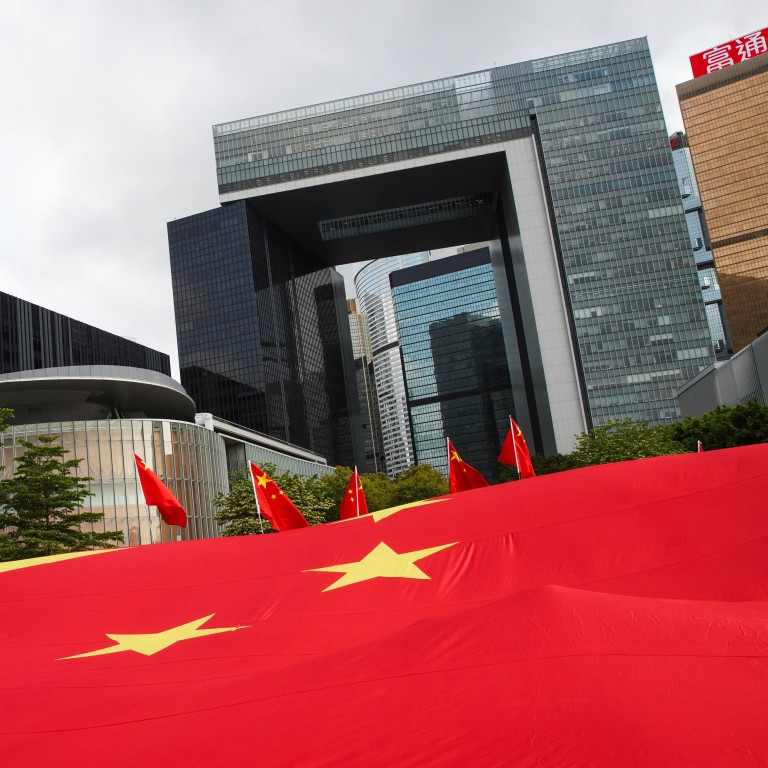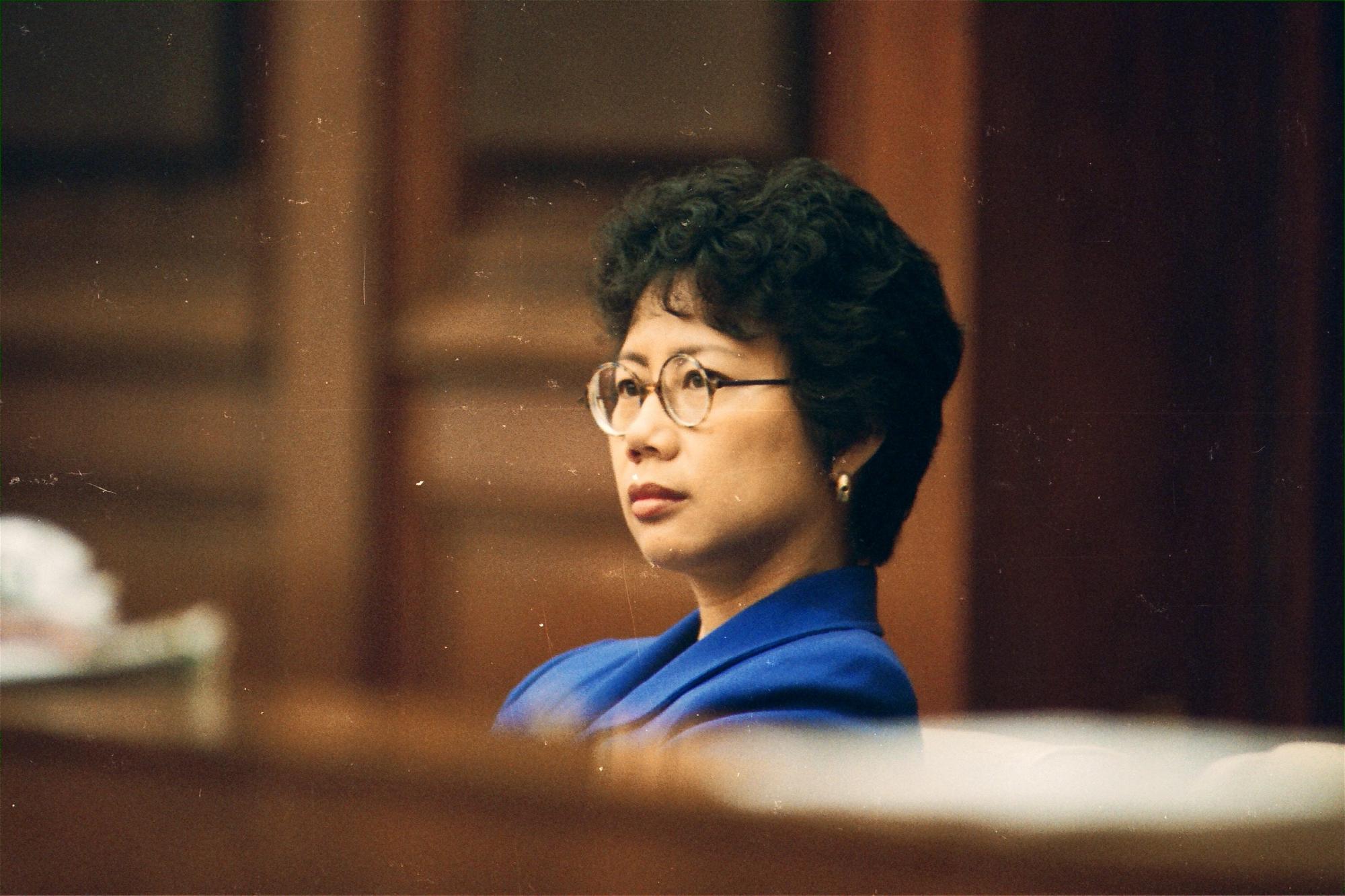
Silence no longer golden as Beijing heralds Communist Party’s key role in Hong Kong
- Symposium discussing party’s implementation of ‘one country, two systems’ principle in city a far cry from scrupulously low-key approach maintained by central government for decades
- Nearly 24 years after the handover, analysts now agree Beijing believes it’s more important to underscore its ‘comprehensive jurisdiction’ over Hong Kong
Beijing’s high-profile gesture of holding a symposium on the Communist Party and its implementation of Hong Kong’s “one country, two systems” principle on Saturday stood in stark contrast to the low-key approach it had employed in the city for decades.
“We firmly believe that as the motherland marches towards a great modern socialist country, Hong Kong compatriots will have a heightened sense of belonging to the motherland, a stronger sense of identification with the party and a stronger sense of pride in being Chinese,” he said.
Luo was addressing a forum titled “The Communist Party of China and the ‘One Country, Two Systems’ model” on Saturday.
The speech, made ahead of the party’s centenary anniversary, was delivered to more than 600 senior figures in Hong Kong public life, including principal officials, lawmakers and businessmen, as well as local delegates to the top legislature, the National People’s Congress, and the Chinese People’s Political Consultative Conference, the nation’s top advisory body.
Co-organised by the liaison office at the Convention and Exhibition Centre in Wan Chai, the event was held exactly two years after police and protesters clashed outside the Legislative Council complex on June 12, 2019, in the opening days of that year’s anti-government protests.
To all intents and purposes, in the past two decades since the city returned to Chinese rule, the party had remained largely invisible in Hong Kong. It had preferred to operate in a low-key, secretive fashion even though its presence in the former British colony dates back to the 1920s, the early days after the party was founded by Chinese intellectuals Chen Duxiu and Li Dazhao.
Since the founding of the People’s Republic of China in 1949, mainland officials had remained coy about the role of the party and its place in Hong Kong.
In April 1995, then lawmaker Christine Loh Kung-wai caused a stir when she sponsored a motion debating the role of the party in the city and its activities after the 1997 handover.
Loh argued at the debate that the party’s role and intentions needed to be further clarified if the policy of one country, two systems was to become a success. Hong Kong would be doomed if the government was run by a “distant politburo which still has only hazy ideas about how modern economies work”, she said at the time.

Loh, who served as the city’s undersecretary for the environment from 2012 to 2017, urged the Hong Kong and British governments to seek clarification from Beijing on whether a branch of the party would exist openly in the city after 1997.
No government official spoke during the debate in 1995.
The then colonial administration had maintained a studious silence on the party’s presence, because of the political sensitivity of an issue that touched on China’s sovereignty.
Defending the government’s reluctance to join the controversial debate, then governor Chris Patten said: “Sometimes the greatest eloquence is silence. I repeat that sometimes silence is golden.”
In those days, Beijing, too, appeared to believe that mantra when it came to the activities of the party in the financial hub.
Beijing to expand Hong Kong office with two new departments focusing on national security and propaganda
Speaking one day after the Legislative Council debate that year, Zhang Junsheng, then deputy director of Xinhua News Agency’s Hong Kong branch, attacked Loh’s motion as “ignorant and stupid”. He said she “does not understand China’s political structure”.
Beijing’s reticence over the party’s role in the city continued even after Xinhua’s branch, which had served as China’s de facto embassy before the handover, was renamed the liaison office in 2000.
Zhang declared the party would not “openly set up a so-called communist party” or party committee in Hong Kong after it returned to Chinese rule in 1997.
Until recently, Beijing officials used to refer to the “central government” when talking about the handling of Hong Kong affairs, scrupulously avoiding the term “Communist Party”.
Christine Loh told the Post her expectation prior to 1997 was that the Communist Party would become more visible in Hong Kong over time. “Today, at the point of the party’s important anniversary, its view is that China’s achievement would not have been possible without the CCP,” she said.
“Luo is a very high-ranking party official with a direct line to the top leadership. They feel it is important to remind Hong Kong the special administrative region is the creation of the party. Hong Kong needs to better understand the political structure of China.
“In Hong Kong, we have been used to the party taking a ‘low-key’ approach because of the long history of this policy,” Loh said. “From Beijing’s point of view, it is disappointing or even mystifying that Hong Kong people seem to not be interested in learning about the mainland.”
“In a major year celebrating the party, it is unsurprising that Luo should emphasise the importance and success of the party and for Hong Kong people to know it better,” she added.
“Hong Kong people have to be loyal Chinese citizens, and with that, Hong Kong has to understand Chinese modern history, the 101 of the CCP and take an interest in mainland affairs,” she continued. “This is far from the end of the world.”
Loh had pushed for another debate on the role of the Communist Party in 1997 and again, Hong Kong government officials did not take part.
Communist Party is not China’s only political party – there are eight others
Speaking on condition of anonymity, a mainland academic familiar with Hong Kong affairs said given the antipathy towards the party among a substantial number of Hongkongers, Beijing had kept a low profile on its role in the past few decades. That, he said, was changing.
“It has been nearly 24 years since the handover, and the central government has weighed in by imposing the national security law and revamping Hong Kong’s electoral system,” the scholar said. “The central government can no longer avoid the party’s role in Hong Kong affairs.”
He said it was an opportune time for Beijing to summarise its achievements in Hong Kong ahead of the 100th anniversary of the party’s founding.
Veteran China-watcher Johnny Lau Yui-siu said Beijing had now chosen to highlight the role of the party in Hong Kong affairs because it needed to underscore that it exercised “comprehensive jurisdiction” over the financial hub.
“Beijing made the high-profile gesture after weighing the pros and cons of doing so,” he said. “It couldn’t care less about the feelings of Hong Kong people and is also unfazed about possible reactions from Western countries.”
Lau Siu-kai, vice-president of the semi-official Beijing think tank the Chinese Association of Hong Kong and Macau Studies, said the emphasis on the party’s role did not imply it would operate openly in Hong Kong soon.
“It’s necessary to highlight that the Communist Party is the founder and guardian of the one country, two systems formula in the solemn occasion to mark the 100th anniversary of the party. But don’t read too much into this,” he said.
Additional reporting by Natalie Wong

